系统功能语言学视角下的生态话语分析
系统功能语言学视角下自然诗歌的生态话语分析

系统功能语言学视角下自然诗歌的生态话语分析作者:王丽娟来源:《科教导刊·电子版》2020年第07期摘要基于系统功能语言学视角下的生态话语分析,本文从评价理论及主位结构角度分析华兹华斯诗歌《写于早春》中的生态价值观。
研究发现,诗歌《写于早春》主要从带有积极色彩的态度鉴赏性评价以及与人类外生命体有关的话题主位的选择来构建诗人积极的生态观。
本研究不仅对自然诗歌的研究有一定的指导意义,而且对提高人们的生态环境保护意识、促进人类与自然的和谐统一有积极的作用。
关键词生态话语分析态度评价主位结构中图分类号:H136 文献标识码:A0引言目前,随着越来越多的全球环境问题的出现,生态问题成了人类社会较重视的一个话题。
实际上生态学的概念早在1866年就已经提出了,但直到20世纪70年代才引起了较多的关注,生态学与其他学科的结合发展也出现了泛化的趋势,形成了农业生态学、经济生态学、人类生态学、生态教育学、生态诗学、生态翻译学、生态语言学等多种学科。
其中生态语言学的出现和发展引起了众多语言学家及语言学爱好者的关注。
目前为止,生态语言学的研究一般被认定为有两种模式:一是“豪根模式”,二是“韩礼德模式”。
前者是隐喻模式,着重关注语言和其所在环境之间的生态关系;后者是非隐喻模式,着重关注语言对生态环境的作用。
两种研究模式的侧重点虽有所不同,但两者却形成一种互补关系。
“韩礼德模式”主要是借助于系统功能语言学的一些理论为工具进行生态话语分析。
黄国文、陈旸运用功能语篇分析方法,对狄金森的自然诗歌《一只小鸟沿小径走来》中的生态话语进行了分析。
苗兴伟、雷蕾以系统功能语言学为理论基础,通过及物性、作格结构、施动性、致使性、语法隐喻及评价资源的分析阐述了生态话语如何构建人类与生态系统之间的关系。
陈令君从系统功能语言学视角下的及物性过程出发,探讨了陶渊明的田园诗歌《归园田居》(其一)及其英译本中的生态观。
但是从系统功能语言学理论视角下对英国诗人华兹华斯的诗歌《写于早春》进行生态话语分析的研究几乎没有人涉及。
语言学视角下的生态观研究
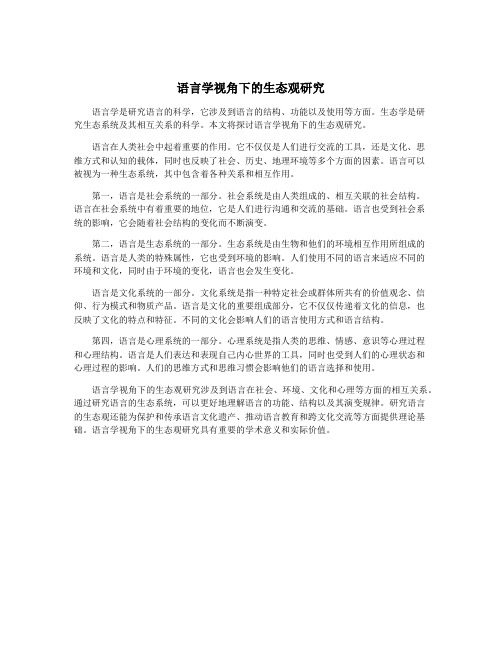
语言学视角下的生态观研究语言学是研究语言的科学,它涉及到语言的结构、功能以及使用等方面。
生态学是研究生态系统及其相互关系的科学。
本文将探讨语言学视角下的生态观研究。
语言在人类社会中起着重要的作用。
它不仅仅是人们进行交流的工具,还是文化、思维方式和认知的载体,同时也反映了社会、历史、地理环境等多个方面的因素。
语言可以被视为一种生态系统,其中包含着各种关系和相互作用。
第一,语言是社会系统的一部分。
社会系统是由人类组成的、相互关联的社会结构。
语言在社会系统中有着重要的地位,它是人们进行沟通和交流的基础。
语言也受到社会系统的影响,它会随着社会结构的变化而不断演变。
第二,语言是生态系统的一部分。
生态系统是由生物和他们的环境相互作用所组成的系统。
语言是人类的特殊属性,它也受到环境的影响。
人们使用不同的语言来适应不同的环境和文化,同时由于环境的变化,语言也会发生变化。
语言是文化系统的一部分。
文化系统是指一种特定社会或群体所共有的价值观念、信仰、行为模式和物质产品。
语言是文化的重要组成部分,它不仅仅传递着文化的信息,也反映了文化的特点和特征。
不同的文化会影响人们的语言使用方式和语言结构。
第四,语言是心理系统的一部分。
心理系统是指人类的思维、情感、意识等心理过程和心理结构。
语言是人们表达和表现自己内心世界的工具,同时也受到人们的心理状态和心理过程的影响。
人们的思维方式和思维习惯会影响他们的语言选择和使用。
语言学视角下的生态观研究涉及到语言在社会、环境、文化和心理等方面的相互关系。
通过研究语言的生态系统,可以更好地理解语言的功能、结构以及其演变规律。
研究语言的生态观还能为保护和传承语言文化遗产、推动语言教育和跨文化交流等方面提供理论基础。
语言学视角下的生态观研究具有重要的学术意义和实际价值。
基于系统功能语言学的生态话语分析
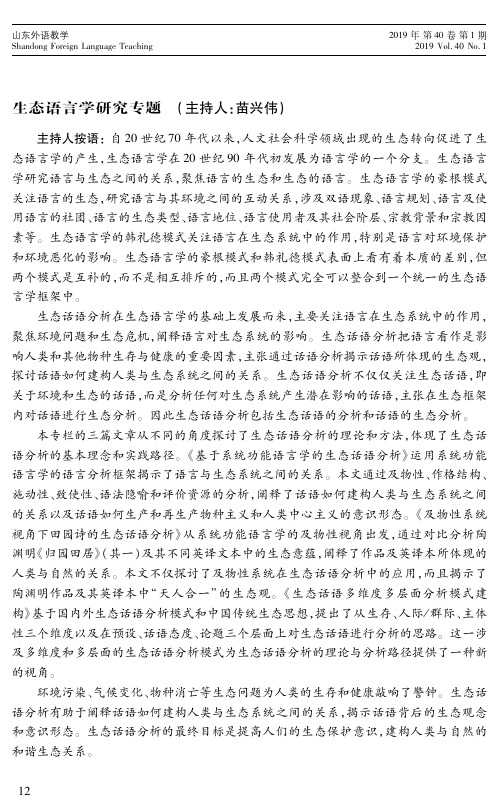
苗兴伟,雷蕾 基于系统功能语言学的生态话语分析
基于系统功能语言学的生态话语分析
苗兴伟 雷蕾
(北京师范大学 外国语言文学学院,北京 100875)
[摘要] 生态话语分析在生态学框架内通过话语分析揭示语言在生态系统中的作用。生态语言学的 韩礼德模式注重通过语言分析阐释语言与生态系统之间的关系。基于系统功能语言学的生态话语分析 通过及物性、作格结构、施动性、致使性、语法隐喻和评价资源的分析阐释生态话语如何建构人类与生态 系统之间的关系,揭示生态话语如何生产和再生产物种主义和人类中心主义的意识形态。 [关键词] 生态语言学;生态话语分析;系统功能语言学 [中图分类号] H08 [文献标识码] A [文献编号] 10022643(2019)01001310
山东外语教学 ShandongForeignLanguageTeaching
2019年 第 40卷 第 1期 2019Vol.40No.1
生态语言学研究专题 (主持人:苗兴伟)
主持人按语:自 20世纪 70年代以来,人文社会科学领域出现的生态转向促进了生 态语言学的产生,生态语言学在 20世纪 90年代初发展为语言学的一个分支。生态语言 学研究语言与生态之间的关系,聚焦语言的生态和生态的语言。生态语言学的豪根模式 关注语言的生态,研究语言与其环境之间的互动关系,涉及双语现象、语言规划、语言及使 用语言的社团、语言的生态类型、语言地位、语言使用者及其社会阶层、宗教背景和宗教因 素等。生态语言学的韩礼德模式关注语言在生态系统中的作用,特别是语言对环境保护 和环境恶化的影响。生态语言学的豪根模式和韩礼德模式表面上看有着本质的差别,但 两个模式是互补的,而不是相互排斥的,而且两个模式完全可以整合到一个统一的生态语 言学框架中。
Abstract:Ecologicaldiscourse analysisattemptsto revealthe role oflanguage in the ecosystem throughdiscourseanalysiswithinanecologicalframework.TheHallidayanapproachofecolinguistics studiestherelationbetweenlanguageandtheecosystem withanemphasisontheanalysisoflan guage.AnSFLbasedapproachtoecologicaldiscourseanalysis,therefore,focusesontheanalysis oftransitivity,ergativity,agency,causality,grammaticalmetaphorandappraisalresourcesinecolog icaldiscourse,andinsodoing,providesinsightsintohow discourseplaysaroleinconstructingthe relationshipbetweenhumanbeingsandtheecosystem,andinproducingandreproducingspeciesist andanthropocentricideologies. Keywords:ecolinguistics;ecologicaldiscourseanalysis;systemicfunctionallinguistics
功能语言学视角下的生态话语分析
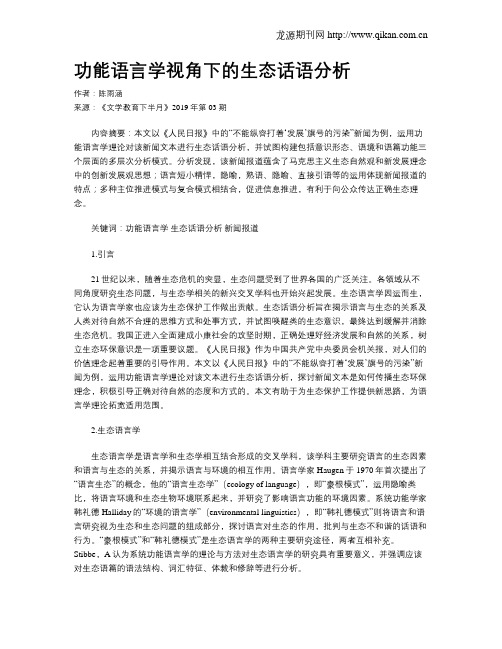
功能语言学视角下的生态话语分析作者:陈雨涵来源:《文学教育下半月》2019年第03期内容摘要:本文以《人民日报》中的“不能纵容打着‘发展’旗号的污染”新闻为例,运用功能语言学理论对该新闻文本进行生态话语分析,并试图构建包括意识形态、语境和语篇功能三个层面的多层次分析模式。
分析发现,该新闻报道蕴含了马克思主义生态自然观和新发展理念中的创新发展观思想;语言短小精悍,隐喻,熟语、隐喻、直接引语等的运用体现新闻报道的特点;多种主位推进模式与复合模式相结合,促进信息推进,有利于向公众传达正确生态理念。
关键词:功能语言学生态话语分析新闻报道1.引言21世纪以来,随着生态危机的突显,生态问题受到了世界各国的广泛关注。
各领域从不同角度研究生态问题,与生态学相关的新兴交叉学科也开始兴起发展。
生态语言学因运而生,它认为语言学家也应该为生态保护工作做出贡献。
生态话语分析旨在揭示语言与生态的关系及人类对待自然不合理的思维方式和处事方式,并试图唤醒类的生态意识,最终达到缓解并消除生态危机。
我国正进入全面建成小康社会的攻坚时期,正确处理好经济发展和自然的关系,树立生态环保意识是一项重要议题。
《人民日报》作为中国共产党中央委员会机关报,对人们的价值理念起着重要的引导作用。
本文以《人民日报》中的“不能纵容打着‘发展’旗号的污染”新闻为例,运用功能语言学理论对该文本进行生态话语分析,探讨新闻文本是如何传播生态环保理念,积极引导正确对待自然的态度和方式的。
本文有助于为生态保护工作提供新思路,为语言学理论拓宽适用范围。
2.生态语言学生态语言学是语言学和生态学相互结合形成的交叉学科,该学科主要研究语言的生态因素和语言与生态的关系,并揭示语言与环境的相互作用。
语言学家Haugen于1970年首次提出了“语言生态”的概念,他的“语言生态学”(ecology of language),即“豪根模式”,运用隐喻类比,将语言环境和生态生物环境联系起来,并研究了影响语言功能的环境因素。
系统功能视角下新闻报道的生态话语分析

基本内容
在21世纪的今天,新闻报道无时无刻不在影响着我们的生活。从政治、经济 到文化、科技,新闻报道的内容和方式深刻地反映了当代社会的各个方面。然而, 随着生态环境的日益恶化,新闻报道也开始生态话题。本次演示将从系统功能视 角出发,探讨新闻报道如何进行生态话语分析。
通过问卷调查和访谈法,我们发现环保类新闻报道对公众的环保意识产生了 积极影响。公众在阅读报道后,普遍意识到环境保护的重要性,并表示愿意采取 行动支持环保事业。同时,报道促使公众对政府、企业等责任主体提出更高要求, 推动相关部门采取更有力的环保措施。
结论
本次演示从生态语言学的视角,探讨了环保类新闻报道的话语。研究发现, 这类报道通过特定的语言策略有效地传达了生态理念,引起了公众对生态环境问 题的和共鸣。然而,为了进一步提高环保类新闻报道的影响力,建议在今后的报 道中更多地借助生态语言学理论,创新话语方式,使内容更具吸引力和感染力。 同时,应公众的反馈,不断改进报道策略,以更好地引导公众参与环保行动。
基本内容
在全球化的时代,英语时事新闻报道在各国间的交流与合作中扮演了至关重 要的角色。然而,新闻报道并不仅仅是信息的传递,而是在意识形态、文化背景 等因素的影响下对现实世界的解读与建构。因此,国际视角下英语时事新闻报道 的批评话语分析研究显得尤为重要。
Hale Waihona Puke 本研究旨在通过对国际英语时事新闻报道进行批评话语分析,以揭示报道中 的意识形态、话语策略及其背后的利益诉求,为读者提供更加全面深入的新闻解 读。该研究具有重要的实践意义和理论价值,不仅有助于提高读者的批判性思维 能力和跨文化交流能力,还有利于推进国际关系的发展与和谐。
本研究采用定性与定量相结合的研究方法。首先,通过对相关理论框架的梳 理,建立适用于英语时事新闻报道批评话语分析的模型。其次,收集具有代表性 的国际英语时事新闻报道作为语料库,采用文本分析法对报道中的词汇、语法和 篇章结构进行深入挖掘。最后,结合相关统计数据,对报道中的意识形态、话语 策略及其利益诉求进行定量分析。
系统功能视角下新闻报道的生态话语分析

北京第二外国语学院学报 2018年第1期 (总第261期)系统功能视角下新闻报道的生态话语分析杨 阳摘 要:生态话语分析能够反映语言和其他生态现象之间的关系,能够从意识上唤醒、引导和改变人类对环境和自然的认识。
在当今社会,随着新闻媒体传播的不断深入,新闻报道不仅发挥着传递信息等社会功能,还不断改变着人们的价值观念和生活方式。
作为对系统功能语言学中人际功能的发展,评价理论对于揭示文本中隐藏的意识形态至关重要。
本文拟在系统功能语言学的视角下,运用评价系统的子系统——态度系统对《卫报》关于美国退出《巴黎协定》的10篇新闻报道进行生态话语分析,旨在揭示西方主流媒体关于气候及环境的意识形态,从而进一步证明评价理论对于生态话语分析尤其是意识形态揭示方面的可操作性和实用性,呼吁人们建立恰当的、有益于生存的生态哲学思想。
关键词:新闻报道;生态话语分析;系统功能视角;评价理论[中图分类号]H0-05 DOI:10.12002/j.bisu.138[文献标识码]A [文章编号]1003-6539(2018)01-0033-13引言人类极尽所能利用自然资源来促进自身的发展,然而在经济、科技飞速发展的同时也严重污染了自然环境,破坏了生态平衡,从而威胁到地球上其他生物的生存。
随着生态问题的日益凸显,人们开始从生态学的角度看待周围的一切,使得许多学科日益生态化。
正是在这样的大背景下,生态语言学应运而生。
生态语言学有两个公认的研究模式,即“豪根模式”和“韩礼德模式”。
“豪根模式”认为语言有自己的生态环境,使用语言的社会以及语言使用者的态度决定了语言生存环境。
“韩礼德模式”则强调语言在解决各种生态问题中的重要作用,突出语言学家的“社会责任”,认为语言的使用能够影响人类社会的生态观念。
著名的生态语言学家Arran Stibbe就采用了“韩礼德模式”,从话语批评的视角审视人们赖以生存的话语,“力图唤醒人类社会的生态意识,用批评的眼光来鼓励和宣传与生态和谐的话语和行为,同时抵制那些与生态不和谐的话语和行为,反思和批评人类对自然的征服、控制、掠夺和摧残”(黄国文,2016)。
系统功能语言学视角下自然诗歌的生态话语分析
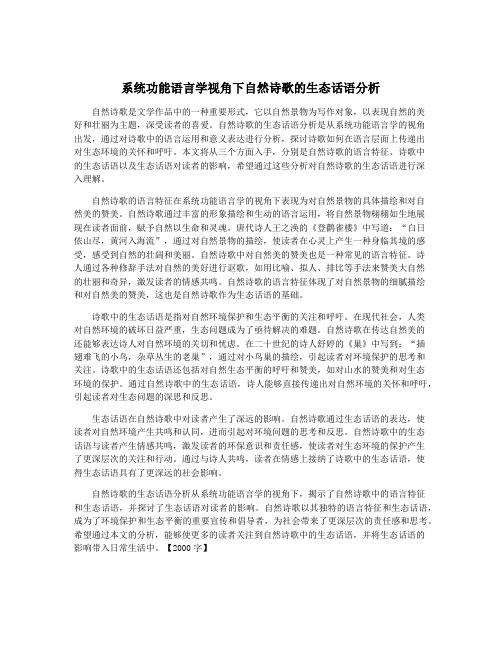
系统功能语言学视角下自然诗歌的生态话语分析自然诗歌是文学作品中的一种重要形式,它以自然景物为写作对象,以表现自然的美好和壮丽为主题,深受读者的喜爱。
自然诗歌的生态话语分析是从系统功能语言学的视角出发,通过对诗歌中的语言运用和意义表达进行分析,探讨诗歌如何在语言层面上传递出对生态环境的关怀和呼吁。
本文将从三个方面入手,分别是自然诗歌的语言特征、诗歌中的生态话语以及生态话语对读者的影响,希望通过这些分析对自然诗歌的生态话语进行深入理解。
自然诗歌的语言特征在系统功能语言学的视角下表现为对自然景物的具体描绘和对自然美的赞美。
自然诗歌通过丰富的形象描绘和生动的语言运用,将自然景物栩栩如生地展现在读者面前,赋予自然以生命和灵魂。
唐代诗人王之涣的《登鹳雀楼》中写道:“白日依山尽,黄河入海流”,通过对自然景物的描绘,使读者在心灵上产生一种身临其境的感受,感受到自然的壮阔和美丽。
自然诗歌中对自然美的赞美也是一种常见的语言特征。
诗人通过各种修辞手法对自然的美好进行讴歌,如用比喻、拟人、排比等手法来赞美大自然的壮丽和奇异,激发读者的情感共鸣。
自然诗歌的语言特征体现了对自然景物的细腻描绘和对自然美的赞美,这也是自然诗歌作为生态话语的基础。
诗歌中的生态话语是指对自然环境保护和生态平衡的关注和呼吁。
在现代社会,人类对自然环境的破坏日益严重,生态问题成为了亟待解决的难题。
自然诗歌在传达自然美的还能够表达诗人对自然环境的关切和忧虑。
在二十世纪的诗人舒婷的《巢》中写到:“插翅难飞的小鸟,杂草丛生的老巢”,通过对小鸟巢的描绘,引起读者对环境保护的思考和关注。
诗歌中的生态话语还包括对自然生态平衡的呼吁和赞美,如对山水的赞美和对生态环境的保护。
通过自然诗歌中的生态话语,诗人能够直接传递出对自然环境的关怀和呼吁,引起读者对生态问题的深思和反思。
生态话语在自然诗歌中对读者产生了深远的影响。
自然诗歌通过生态话语的表达,使读者对自然环境产生共鸣和认同,进而引起对环境问题的思考和反思。
从系统功能语言学到生态语言学
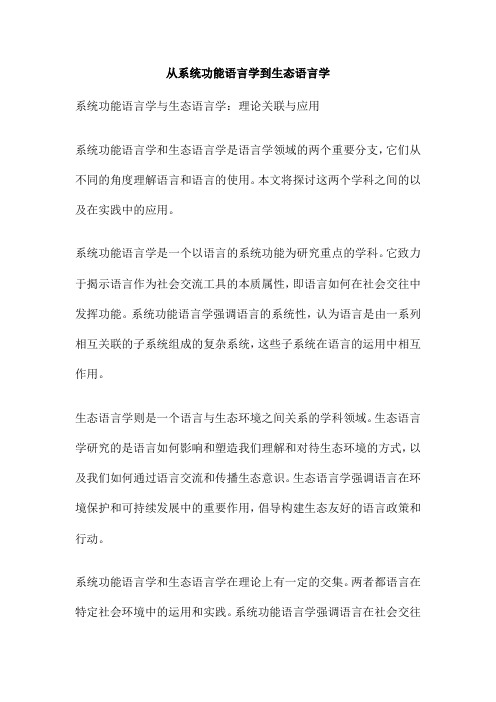
从系统功能语言学到生态语言学系统功能语言学与生态语言学:理论关联与应用系统功能语言学和生态语言学是语言学领域的两个重要分支,它们从不同的角度理解语言和语言的使用。
本文将探讨这两个学科之间的以及在实践中的应用。
系统功能语言学是一个以语言的系统功能为研究重点的学科。
它致力于揭示语言作为社会交流工具的本质属性,即语言如何在社会交往中发挥功能。
系统功能语言学强调语言的系统性,认为语言是由一系列相互关联的子系统组成的复杂系统,这些子系统在语言的运用中相互作用。
生态语言学则是一个语言与生态环境之间关系的学科领域。
生态语言学研究的是语言如何影响和塑造我们理解和对待生态环境的方式,以及我们如何通过语言交流和传播生态意识。
生态语言学强调语言在环境保护和可持续发展中的重要作用,倡导构建生态友好的语言政策和行动。
系统功能语言学和生态语言学在理论上有一定的交集。
两者都语言在特定社会环境中的运用和实践。
系统功能语言学强调语言在社会交往中的功能,而生态语言学则强调语言在处理和传播生态信息中的重要性。
两者都语言系统的内在规律和结构,生态语言学家也会研究诸如生态语篇分析、绿色话语分析等语言系统的生态特征。
在实践应用中,系统功能语言学和生态语言学也具有广泛的应用。
例如,系统功能语言学可以用于开发具有生态意识的机器翻译系统,帮助人们更好地理解和传播生态信息。
同时,生态语言学可以借助系统功能语言学的理论和方法,深入分析生态语篇中的语义、语法和语用特征,以促进人们对生态环境问题的理解和。
这两个学科的结合还可以用于教育领域。
通过将生态理念融入语言教育,我们可以培养具有环保意识的语言使用者,促进可持续发展的社会价值观的传播。
总结起来,系统功能语言学和生态语言学虽然的语言的方面不同,但它们在理论和实践上都有相互交叉和影响。
通过理解两个学科的关联性和互动性,我们可以更好地利用和发展它们的知识和方法,以解决现实生活中的问题,特别是在环境保护和可持续发展方面。
系统功能语言学视角下自然诗歌的生态话语分析

系统功能语言学视角下自然诗歌的生态话语分析1. 引言1.1 研究背景自然诗歌作为文学艺术的重要形式之一,自古以来就受到人们的推崇和喜爱。
而随着环境问题日益严重,生态话题也逐渐成为诗人们关注的焦点之一。
对于自然诗歌的生态话语进行分析,有助于更深入地理解诗歌作品中的生态意义和生态思想。
在过去的研究中,对于自然诗歌的言语特征和意义探讨主要着眼于诗歌的形式、艺术特色以及情感表达等方面。
在系统功能语言学的视角下,我们可以通过对诗歌文字中的语言结构、功能和意义进行分析,揭示其中蕴含的更为深刻的生态话语信息。
将系统功能语言学与生态话语分析相结合,对自然诗歌进行研究,是一种全新的探讨方式,有助于揭示诗歌作品中反映的生态观念和情感内涵。
本文旨在通过对自然诗歌的生态话语进行系统功能语言学视角下的分析,探讨自然诗歌在生态话语中的表达方式与意义,从而深入探讨诗歌作品中的生态留声与情感表达。
【此处省略部分字数】1.2 研究目的研究目的是通过系统功能语言学视角下的生态话语分析,探讨自然诗歌中的生态主题及其表达方式。
具体目的包括:分析自然诗歌的语言特点,揭示自然诗歌中反映的生态观念;探讨生态话语分析方法在自然诗歌研究中的应用,深化对自然诗歌生态话语的理解;通过系统功能语言学视角分析自然诗歌,揭示语言结构与生态思想的关系,探讨自然诗歌如何通过语言表达生态主题;探讨自然诗歌的生态话语表达方式,分析自然元素在诗歌中的象征意义与生态意蕴。
通过研究自然诗歌的生态话语,可以丰富系统功能语言学在文学研究领域的应用,深化对自然与诗歌之间的关系的认识,为生态文学研究提供新的视角和方法。
1.3 研究意义自然诗歌是人类对自然的热爱与赞美的载体,是文学中一种独特的形式。
而通过系统功能语言学视角下对自然诗歌进行生态话语分析,可以揭示其中的生态意义与内涵。
这种研究具有重要的意义:通过对自然诗歌进行生态话语分析,可以更深入地理解其中蕴含的生态意识和生态价值观。
系统功能语言学视角下自然诗歌的生态话语分析

系统功能语言学视角下自然诗歌的生态话语分析系统功能语言学认为,语言是一种社会功能,不仅仅是一种交流工具,同时还承载着社会文化和认知心理等方面的信息。
在自然诗歌中,生态话语正是承载了自然环境和人类文化体验的信息,同时也表达了对生态环境的理解和态度,是自然诗歌的重要组成部分。
首先,自然诗歌中的生态话语展现了对自然环境的感悟和体验。
诗歌中的自然景物、生物、气候等元素,具有强烈的感官形象,能够让读者身临其境地感受自然之美。
例如,唐代诗人王之涣的《登鹳雀楼》中写道:“白日依山尽,黄河入海流。
欲窮千里目,更上一層樓。
”通过形象的描写,使读者体验到了黄河的壮阔和山水的秀美。
此外,生态话语还包含了对自然界生命力和生态系统的认识,如唐代诗人白居易的《赋得古原草送别》中写到:“离离原上草,一岁一枯荣。
野火烧不尽,春风吹又生。
”体现了对自然界自我修复能力的认知。
其次,自然诗歌中的生态话语也反映了对生态环境的关注和保护。
历史上不少诗人通过诗歌表达了对生态环境的热爱和保护,如唐代诗人王之涣的《登鹳雀楼》中写道:“众水同此志,万山峥嵘高。
”表达了对自然界万物共存、物竞天择的理解和敬畏;唐代诗人白居易的《赋得古原草送别》中写到:“归来见此景,胡儿为我笑。
既无食且贫,又无衣且寒。
不能享受福,自觉身劳顿。
遂欲作诗赋,聊以表吾情。
”表达了对生态环境的珍视和保护的观点。
最后,自然诗歌中的生态话语也带有一定的文化内涵。
自然诗歌往往是文化传承的重要途径之一,通过诗歌的艺术表现形式,传达文化内涵和价值观念。
例如,唐代诗人王之涣的《登鹳雀楼》中,提到了建筑和文化融合的问题:“宏图霸业实,运筹帷幄间。
冯唐易老瘦,不废江河万古流。
”反映了在当时的中国,文化和建筑的融合是文化发展的重要方向之一,透露出一种传统文化的内涵。
综上所述,自然诗歌的生态话语不仅仅是一种文学形式,更是一种表达自然与人类互动关系的话语。
通过对自然诗歌中的生态话语的分析,可以更好地理解自然环境和人类文化的复杂性,同时也为生态文明和可持续发展提供了思路和方向。
从系统功能语言学角度看生态话语分析——以艾米莉·狄金森的《穿过小径,穿过荆棘》为例
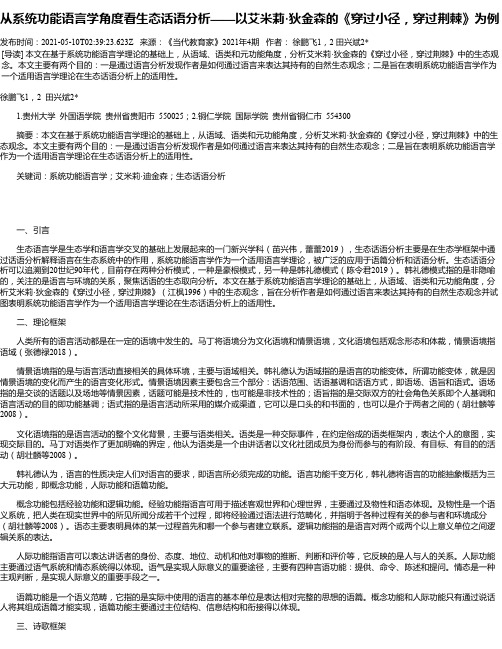
从系统功能语言学角度看生态话语分析——以艾米莉·狄金森的《穿过小径,穿过荆棘》为例发布时间:2021-05-10T02:39:23.623Z 来源:《当代教育家》2021年4期作者:徐鹏飞1,2 田兴斌2* [导读] 本文在基于系统功能语言学理论的基础上,从语域、语类和元功能角度,分析艾米莉·狄金森的《穿过小径,穿过荆棘》中的生态观念。
本文主要有两个目的:一是通过语言分析发现作者是如何通过语言来表达其持有的自然生态观念;二是旨在表明系统功能语言学作为一个适用语言学理论在生态话语分析上的适用性。
徐鹏飞1,2 田兴斌2* 1.贵州大学外国语学院贵州省贵阳市 550025;2.铜仁学院国际学院贵州省铜仁市 554300摘要:本文在基于系统功能语言学理论的基础上,从语域、语类和元功能角度,分析艾米莉·狄金森的《穿过小径,穿过荆棘》中的生态观念。
本文主要有两个目的:一是通过语言分析发现作者是如何通过语言来表达其持有的自然生态观念;二是旨在表明系统功能语言学作为一个适用语言学理论在生态话语分析上的适用性。
关键词:系统功能语言学;艾米莉·迪金森;生态话语分析一、引言生态语言学是生态学和语言学交叉的基础上发展起来的一门新兴学科(苗兴伟,蕾蕾2019),生态话语分析主要是在生态学框架中通过话语分析解释语言在生态系统中的作用,系统功能语言学作为一个适用语言学理论,被广泛的应用于语篇分析和话语分析。
生态话语分析可以追溯到20世纪90年代,目前存在两种分析模式,一种是豪根模式,另一种是韩礼德模式(陈令君2019)。
韩礼德模式指的是非隐喻的,关注的是语言与环境的关系,聚焦话语的生态取向分析。
本文在基于系统功能语言学理论的基础上,从语域、语类和元功能角度,分析艾米莉·狄金森的《穿过小径,穿过荆棘》(江枫1996)中的生态观念,旨在分析作者是如何通过语言来表达其持有的自然生态观念并试图表明系统功能语言学作为一个适用语言学理论在生态话语分析上的适用性。
系统功能语言学视角下的生态话语分析
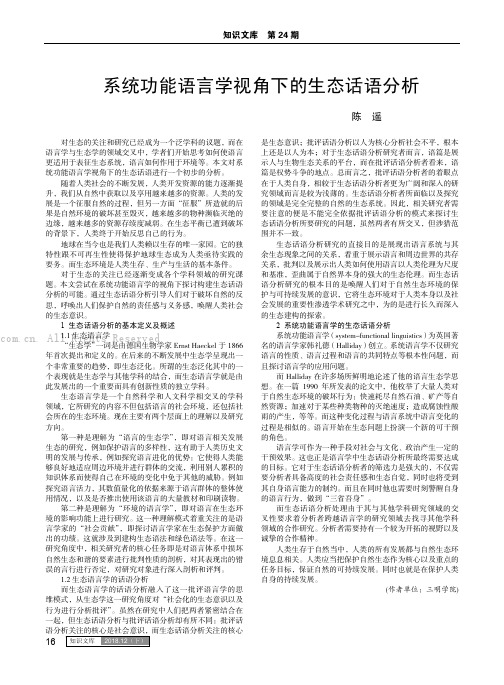
知识文库 第24期16 系统功能语言学视角下的生态话语分析陈 遥对生态的关注和研究已经成为一个泛学科的议题,而在语言学与生态学的领域交叉中,学者们开始思考如何使语言更适用于表征生态系统,语言如何作用于环境等。
本文对系统功能语言学视角下的生态话语进行一个初步的分析。
随着人类社会的不断发展,人类开发资源的能力逐渐提升,我们从自然中获取以及享用越来越多的资源。
人类的发展是一个征服自然的过程,但另一方面“征服”所造就的后果是自然环境的破坏甚至毁灭,越来越多的物种濒临灭绝的边缘,越来越多的资源存续度减弱。
在生态平衡已遭到破坏的背景下,人类终于开始反思自己的行为。
地球在当今也是我们人类赖以生存的唯一家园。
它的独特性跟不可再生性使得保护地球生态成为人类亟待实践的要务。
而生态环境是人类生存、生产与生活的基本条件。
对于生态的关注已经逐渐变成各个学科领域的研究课题。
本文尝试在系统功能语言学的视角下探讨构建生态话语分析的可能。
通过生态话语分析引导人们对于破坏自然的反思,呼唤出人们保护自然的责任感与义务感,唤醒人类社会的生态意识。
1 生态话语分析的基本定义及概述 1.1生态语言学 “生态学”一词是由德国生物学家Ernst Haeckel 于1866年首次提出和定义的。
在后来的不断发展中生态学呈现出一个非常重要的趋势,即生态泛化。
所谓的生态泛化其中的一个表现就是生态学与其他学科的结合,而生态语言学就是由此发展出的一个重要而具有创新性质的独立学科。
生态语言学是一个自然科学和人文科学相交叉的学科领域,它所研究的内容不但包括语言的社会环境,还包括社会所在的生态环境。
现在主要有两个层面上的理解以及研究方向。
第一种是理解为“语言的生态学”,即对语言相关发展生态的研究,例如保护语言的多样性,这有助于人类历史文明的发展与传承,例如探究语言进化的优势:它使得人类能够良好地适应周边环境并进行群体的交流,利用别人累积的知识体系而使得自己在环境的变化中免于其他的威胁。
系统功能语言学视角下的话语分析

系统功能语言学视角下的话语分析一、本文概述在语言学领域,话语分析作为一个重要的分支,旨在深入探讨语言在实际交流中的应用和效果。
本文将从系统功能语言学的视角出发,对话语分析进行深入的研究和探讨。
系统功能语言学,作为一种全面而系统的语言学理论,注重语言的社会功能和交际功能,为我们理解和分析话语提供了独特的视角和方法。
本文将首先简要介绍系统功能语言学的基本理论框架和核心观点,为后续的话语分析提供理论基础。
接着,我们将深入探讨话语分析的核心概念和研究范围,包括话语的构成、话语的功能、话语的交际策略等。
然后,我们将结合具体的语料,运用系统功能语言学的理论工具,对话语进行深入的分析和解读,揭示话语背后的深层结构和语义关系。
通过本文的研究,我们期望能够深化对系统功能语言学和话语分析的理解,提高我们在实际交流中运用语言的能力,同时也为语言学的研究提供新的视角和方法。
二、系统功能语言学理论基础系统功能语言学(Systemic Functional Linguistics)是由英国语言学家M.A.K. Halliday创立的一种语言学理论。
它强调语言不仅是表达个人情感和思想的工具,更是一种社会符号,承载着社会和文化的信息。
系统功能语言学认为,语言具有三大元功能:概念功能、人际功能和篇章功能。
概念功能指的是语言对人们在现实世界(包括内心世界)中的各种经历的表达,它体现的是经验与现实的关系。
人际功能则是指语言在人际交往中所起的作用,包括建立、维持和破坏人际关系等,它体现了说话者的身份、地位、态度以及对听话者的判断等。
而篇章功能则关注语言在信息组织中的作用,如何将信息有效地组织起来,使其连贯、有逻辑。
在系统功能语言学中,语言被视为一种社会符号系统,这个系统由多个子系统构成,包括音系层、词汇语法层和语义层等。
这些子系统相互关联,共同实现语言的三大元功能。
系统功能语言学还强调语境的重要性,认为语境是理解和解释语言使用的重要因素。
系统功能语言视角下的生态话语分析——以英文公益短片Nature_Is_Speaking为例

ENGLISH ON CAMPUS2022年43期总第639期系统功能语言视角下的生态话语分析——以英文公益短片Nature Is Speaking为例摘 要:生态话语分析从生态的角度审视语言的结构和使用。
本文从及物性、作格性、语气等对纪录片Nature Is Speaking的文本进行生态视角的解读,探究话语生产者如何通过语言手段有效地影响受众对生态的认识。
研究发现,该纪录片主要通过过程类型和作格模式的选择、主位结构和信息结构的安排等手段“突显”人类赖以生存的生态系统和生命体以及过度消耗所带来的生态破坏,从而抵制“自然是用之不尽的资源宝库”,提倡人类应尊重、关爱自然并直面各种生态问题。
关键词:生态话语分析;环保纪录片;系统功能语言学作者简介:李曼(1997.03-),女,浙江温州人,浙江师范大学,硕士研究生,研究方向:系统功能语言学、话语分析。
生态话语分析是生态语言学的研究范围之一,旨在发现语言使用中对生态保护具有消极影响的因素。
如Gerbig、Schleppegrell发现采用名物化可以省略或掩盖施事,从而避免谈及行为的责任主体。
还有学者如Stibbe、Slater等采取批评话语分析模式对猪肉行业、动物制品等话语进行分析,发现人类活动造成的环境破坏在主流话语中往往被淡化。
近年来,生态语言学在国内发展较快。
韩军指出国内生态语言学的研究对语言的批评或微观研究偏少。
面对这一情况,中国学者积极开展尝试。
如赵蕊华以银无须鳕为例,从系统功能视角出发分析了生态评估报告中构建非人类动物身份的手段,从而揭示了生态报告中的问题。
杨阳从生态语言学的视角分析了《卫报》新闻报道中的态度资源,揭示了西方主流媒体在气候问题上的意识形态。
一、目的及意义Nature Is Speaking上映于 2015 年,是由国际非营利环保机构——保护国际基金会制作的环保公益短片。
该短片中大自然被赋予生命,呼吁人类感知大自然的所知所见,蕴含了丰富的生态意识。
系统功能语言学视角下自然诗歌的生态话语分析——以《水仙花》为例

Modern Linguistics 现代语言学, 2019, 7(4), 454-459Published Online August 2019 in Hans. /journal/mlhttps:///10.12677/ml.2019.74059Eco-Discourse Analysis of Natural Poetryfrom the Perspective of Systemic Functional Linguistics—Taking the Daffodils as an ExampleXin Han, Hongtao LiuBeijing University of Technology, BeijingReceived: July 16th, 2019; accepted: July 31st, 2019; published: August 7th, 2019AbstractWilliam Wordsworth, the British Poet Laureate, is an important representative of the “Lake poets”.In his life, he wrote many poems describing nature, expressing his yearning for rural life and nat-ural scenery. Based on Halliday’s systemic functional linguistics, focusing on register and me-ta-functions, this paper analyzes The Daffodils from the perspective of Eco-discourse analysis, try-ing to reveal how Wordsworth expresses his ecological view and attitude towards nature. Through the Ecological Discourse Analysis of poetry, this paper tries to advocate people to be close to and love nature, and improve people’s awareness of ecological protection.KeywordsEco-Discourse Analysis, Systemic Functional Linguistics, The Daffodils, Nature Poetry系统功能语言学视角下自然诗歌的生态话语分析——以《水仙花》为例韩鑫,刘宏涛北京工业大学,北京收稿日期:2019年7月16日;录用日期:2019年7月31日;发布日期:2019年8月7日韩鑫,刘宏涛摘要威廉·华兹华斯,英国桂冠诗人,“湖畔派”诗人的重要代表。
系统功能语言学视角下对《闲情偶寄》的生态语篇分析

An Ecological Discourse Analysis of Casual Expressions of Idle Feeling from thePerspective of Systemic Functional Linguistics系统功能语言学视角下对《闲情偶寄》的生态语篇分析摘要在社会迅速发展和生态矛盾日益凸显的环境下,对生态话语的研究成为语言学研究的新方向。
李渔是明末清初的杰出文人,他的文章通俗易懂,质朴有趣,《闲情偶寄》是其代表作品之一。
这本书从各个方面体现了中国古人的生存智慧,展现了一幅人与自然和谐相处的美好画卷。
所以,分析这种语言表达,挖掘其中丰富的生态哲学、美学思想,并找出其中特有的语篇模式对生态话语研究有一定的积极意义。
本研究运用系统功能语言学框架中的语篇分析方法对李渔的《闲情偶寄》进行生态视角的语篇分析,将所选取的语料按照不同的主题分类进行分析,每一个短篇采用了相适应的语篇分析方法,将潜藏在其中的生态哲学思想挖掘出来。
通过研究分析发现,语篇模式理论以及系统功能语法能够用于中国古代散文的分析。
《闲情偶寄》中大量使用了综述-分述,主张-反主张,提问-回答,问题-解决四种主要的语篇模式。
在同一个语篇内,不同的语篇模式在各个语篇层次上互相穿插,交互使用,以表达作者的写作意图。
研究证明,语篇模式是根植于人们心中数千年的一种篇章宏观结构模式,因此具有约定俗成的稳定性特点。
李渔的思想继承包含了中国传统哲学的生态思想,其中包括儒家生态哲学中的“仁”与“和”。
《闲情偶寄》可以作为李渔生态哲学思想的集中表达和完美体现,他强调了人与自然之间的相互尊重以及相互依靠的和谐生态关系。
这从生态角度来看有很强的积极作用。
因此,《闲情偶寄》可以被归类为生态积极话语,也就是说,这种话语对生态的可持续发展起到了积极作用。
关键词:《闲情偶寄》;李渔;系统功能语言学;语篇分析;生态哲学With the rapid development of society and the increasingly prominent ecological issues,the study of ecological discourse has become a new direction of linguistic research.Li Yu is an outstanding literati in the late Ming and early Qing dynasty.His essays are easy-understanding and interesting.Casual Expressions of Idle Feeling is one of his representative works.This book reflects the wisdom of ancient Chinese from all aspects,and shows a beautiful picture of harmonious unity between man and nature.This study analyzes the discourses in Casual Expressions of Idle Feeling within the framework of systemic functional linguistics.The selected corpus is classified according to different themes.Appropriate discourse analysis methods are adopted to analyze a certain extract to dig out the underlying ecological philosophy.It is proved that the textual pattern theories and some related Systemic Functional Linguistic theories are powerful tools in the analysis of the Chinese ancient classics.And the most commonly employed textual patterns in Casual Expressions of Idle Feeling are patterns of general-specific,claim-counterclaim, question-answer and problem-solution.Besides,a text may have more than one textual patterns.A pattern may include or be embedded within another pattern of the text to help explain and illustrate what the author wants to reveal.In this book,Li Yu emphasizes the healthy relationship and the mutual respect between man and nature in order to achieve a harmony between human beings and nature.Thus,Li Yu can be regarded as an ecological man and writer and his Casual Expressions of Idle Feeling is an eco-beneficial discourse,dealing with the human-nature relationship.Keywords:Casual Expressions of Idle Feeling;Li Yu;Systemic Functional Linguistics;Discourse Analysis;Ecological Philosophies摘要 (Ⅰ)Abstract (Ⅱ)Chapter One Introduction (1)1.1Research Background (1)1.2Research Significance (2)1.3Research Objectives and Methodology (4)1.4Structure of the Thesis (5)Chapter Two Literature Review (6)2.1Introduction (6)2.2Previous Studies on Li Yu and Casual Expressions of Idle Feeling (6)2.2.1Introduction to Li Yu and Casual Expressions of Idle Feeling (6)2.2.2Studies on Li Yu and Casual Expressions of Idle Feeling at Home (8)2.2.3Studies on Li Yu and Casual Expressions of Idle Feeling Abroad (11)2.3Previous Studies on Ecolinguistics (13)2.3.1Development of Ecolinguistics (13)2.3.2Studies on Ecological Discourse Analysis Abroad (15)2.3.2Studies on Ecological Discourse Analysis at Home (16)Chapter Three Theoretical Framework (19)3.1Introduction (19)3.2Systemic Functional Approach to Discourse Analysis (19)3.2.1Textual Pattern Theory (19)3.2.1.1A Text-centered Approach within a Semiotic Framework (19)3.2.1.2Problem-Solution Pattern (20)3.2.1.3General-Specific Pattern (22)3.2.1.4Claim-Counterclaim Pattern (24)3.2.1.5Question-Answer Pattern (26)3.2.2Theme&Thematic Progression (27)3.2.2.1The Three Metafunctions (27)3.2.2.2Identification of Theme (28)3.2.2.3Thematic Progression (28)3.2.3Projection Theory (30)3.2.3.1The Definition of Projection (30)3.2.3.2Classification of Projection (31)3.3Introduction to the Chinese Ecological Philosophies (34)3.3.1Harmonious Unity between Man and Nature (34)3.3.2Taoism’s Eco-philosophical Thinking about the Harmonious Relationbetween Man and Nature (35)3.3.3Confucians’Eco-philosophical Thinking about the Harmonious Relationbetween Man and Nature (38)3.3.4Differences in the Universal-Benevolence Principle (40)Chapter Four Practical Analysis of Casual Expressions of Idle Feeling (42)4.1A Practical Analysis of Goose Feet Text under the Guidance of Claim-Counter-claim Textual Pattern (42)4.2A Practical Analysis of Fish Text under the Guidance of General-Specific TextualPattern (47)4.3A Practical Analysis of Enjoying Plum Text under the Guidance of Problem-Solution Textual Pattern (50)4.4A Practical Analysis of Crape Myrtle Text under the Guidance of Question-Answer Textual Pattern (54)Chapter Five Conclusion (64)5.1Major Findings of the Study (64)5.2Limitations of the Study (69)Bibliography (71)Acknowledgments (77)Chapter One IntroductionAs the first part of the thesis,chapter one gives a general introduction to the research background and significance,research objectives and methods,and the structure of this thesis.1.1Research BackgroundChina has had a history of opening up to the outside world for more than forty years.During this period,all walks of life in China have been fully developed, China’s economic strength has been greatly enhanced and people’s living standards have been greatly improved.Yet in the process of economic development,some aspects in China have caused damage to our environment.Despite the seemingly healthy lifestyles in modern cities,the ecological crisis,including global plague, garbage pollution,energy shortages,species extinction and the like,are threatening the very existence of all kinds of life on the planet.Our environment is changing downhill right under our nose yet the changes are scarcely noticed by us.Nowadays,China is standing at a new starting point.In November2012,the18th National Congress of the Party made a strategic decision of“vigorously promoting the construction of ecological civilization”.The report of the18th National Congress not only discusses the major achievements,important status and important objectives of the construction of ecological civilization,but also comprehensively and profoundly discusses all aspects of the construction of ecological civilization.The construction of ecological civilization is a long-term plan related to the well-being of the people and the future of the nation.In the face of the severe situation of tight resource constraints, serious environmental pollution and degradation of the ecosystem,we must establish the concept of ecological civilization that respects,conforms to and protects nature, place the construction of ecological civilization in a prominent position and strive to build a beautiful China and realize the sustainable development of China,as PresidentXi stresses that clear waters and green mountains are mountains of gold and silver or invaluable assets.It is worth mentioning that ancient Chinese people have already realized the importance of ecological protection.And ancient Chinese classics crystallized the wisdom of Chinese people.Some of the ideas and thoughts are creative and avant-garde,and they can still be applied to today’s society.Li Yu’s Casual Expressions of Idle Feeling(Xian Qing Ou Ji)was published in1671.It is full of unique aesthetics,leisure philosophy of life,and rich ecological thoughts.Lin Yu-tang, in his book The Importance of Living,rated it as a pocket guide to the art of life of the Chinese people,and said that Li Yu himself had“a novel comment on everything”. Though published several centuries ago,this book,Casual Expressions of Idle Feeling,is still brimming over with energy and vitality.Not only a summary and sublimation of Li Yu’s own leisure life experiences,this book is also a masterpiece full of traditional ecological philosophy and ecological thoughts.It provides a panorama of ancient Chinese life,including the ancient life style,leisure and entertainment,and the ancient view of the relationship between man and nature. Today,as the ecological issues have become a serious social problem in the world,it is of great referential and warning values to excavate the philosophy and ecological thoughts in this book and integrate them into the present ecological civilization construction.1.2Research SignificanceUnder the guidance of systemic functional linguistics and related discourse analysis theories,this thesis attempts to excavate the ecological and philosophical thoughts of this masterpiece,Casual Expressions of Idle Feeling,by exploring the selected micro-register texts from this book as the data.The significance of this thesis will be listed as follows:In the first place,this study helps further clarify the significant guiding role of systemic functional linguistics in the study of Chinese classics.The guidance ofsystemic functional linguistics and related discourse analysis tools in the studies of Casual Expressions of Idle Feeling can help to dig out the profound ecological aesthetics and ecological philosophical thinking contained in this book and to provide a new angle for the study of Chinese classics.Currently,the application of SFL mainly focuses on the study of language teaching,political speeches,news reports, advertisements,poems and so on,yet there is not much application of SFL in Chinese classic essay.The existing literature shows that the current studies of Casual Expressions of Idle Feeling mainly focus on aesthetics,Chinese opera theories, landscape and home design thoughts,while the research of Casual Expressions of Idle Feeling from the perspective of the ecological aesthetics and ecological philosophical thinking under the guidance of the systemic functional grammar is really scarce.Thus, this thesis is expected to enrich the studies of SFL and Chinese classics and provide some references for future studies on Casual Expressions of Idle Feeling.In the second place,in recent years,with the rapid development of economy, ecological crisis caused by environmental pollution and ecological disruption has become an increasingly serious social problem.The conflict between man and nature is intensifying.It poses a threat not only to the planet,but to all humanity.The Chinese people have already recognized the significance of ecological problems as early as in ancient times.On the basis of advocating a harmonious lifestyle,they proposed the philosophy of“harmony between man and nature”,which is the core of the ancient Chinese philosophy and has been reflected in many ancient classics.Thus, the thesis which aims to examining the ecological philosophical thinking carried in Chinese classics is an active response to the ecological issues.Last but not least,the book Casual Expressions of Idle Feeling actually contains a wealth of the valuable ecological philosophical thinking and ecological aesthetics of Confucianism,Taoism,and other ancient Chinese thoughts.Traditional Chinese philosophy,in some sense,is ecological philosophy.The profound ecological philosophical thinking and ecological aesthetics contained in Casual Expressions of Idle Feeling are beneficial and instructive to help solve the ecological problem of the contemporary society.Thus,the examination of ecological philosophical thinkingcarried in Casual Expressions of Idle Feeling can help solve the ecological issues by changing people’s ways of dealing with nature.1.3Research Objective and MethodologyThis study takes the selected micro-register texts from Li Yu’s Casual Expressions of Idle Feeling as data,and attempts to excavate the underlying ecological and philosophical thoughts of this masterpiece under the guidance of the systemic functional linguistics and related discourse analysis theories.To accomplish this research objective,the following three questions will be discussed in this thesis:(1)Is it feasible and reasonable for the textual pattern theories and some related systemic functional linguistics to be applied in the analysis of the Chinese ancient classics?(2)How can the textual pattern theories and some related systemic functional linguistics be employed to guide the discourse analysis of the micro-register texts in the Chinese classics so as to excavate the underlying profound concepts and connotation?(3)Why is it rational to regard Li Yu’s Casual Expressions of Idle Feeling as an eco-philosophical work?What kind of eco-philosophical thinking and conceptions are embodied in the text?To answer the research questions,the qualitative methodology will be used in this thesis as an effective way to study and analyze the selected examples.The data used in this thesis come from the version of Casual Expressions of Idle Feeling published by Phoenix Science Press in2018.To be specific,representative examples are collected and classified first.Then these cases will be analyzed and discussed based on the related systemic functional linguistics and the corresponding textual pattern theories.1.4Structure of the ThesisThis thesis consists of five chapters.Chapter one is an introduction.In this chapter,the research background,significance,objectives and research methodology are introduced.And the structure of the thesis will also be given.Chapter two is literature review.It mainly reviews the previous studies on Li Yu and his Casual Expressions of Idle Feeling at home and abroad.And the previous corresponding studies on ecolinguistics and ecological discourse analysis will be discussed.Chapter three mainly focuses on the theoretical framework of this research.In this chapter,the theoretical framework of this study is presented.It starts with the introduction to the theoretical foundations of this study,which includes textual pattern theory,the theory of thematic progression and projection theory.And then the ecological philosophies,including Confucianism and Taoism,are presented.Chapter four is the main body of this thesis.This chapter is to make a practical analysis of the selected sample texts taken from Casual Expressions of Idle Feeling written by Li Yu.The analysis and discussion is to be carried out under the guidance of systemic functional linguistic theories of textual patterns,theme and thematic structure progression and projection in order to dig up Li Yu’s profound eco-philosophical thinking.The last chapter is the conclusion part.This chapter will summarize the major findings of the study.And the limitations of the study will also be included in this chapter.Chapter Two Literature Review2.1IntroductionThis chapter will first give a brief introduction of Li Yu and his book Casual Expressions of Idle Feeling.Then the previous studies on Li Yu and the book will be reviewed.After that,the previous corresponding studies on ecolinguistics and ecological discourse analysis will be discussed.2.2Previous Studies on Li Yu and Casual Expressions of Idle Feeling2.2.1Introduction to Li Yu and Casual Expressions of Idle FeelingLiving in the period between late Ming and early Qing dynasties,Li Yu was born in1611,in Rugao,a city in Zhejiang province.His early life is very different from his later life.In fact,Li Yu lives a relatively rich life in his early years.His family is engaged in medicine business and runs a herbal store.Li Yu is said to be a genius for his talent of composing poems and a good memory.In ancient China,merchants are the lowest social grade and he who excels in studying can go into politics,so Li Yu’s family and Li Yu himself all hope he can pass the imperial examination,so that he can be awarded an official post,thus raising their social status.Therefore,Li Yu has received a good education.Li Yu showed his wisdom in his early life.However,things always go not smoothly.In1628,his father’s death had brought about a worsening family situation.The next year a war was broken out.And it is the late Ming dynasty.Li Yu had failed exams again and again.At last he decided to give up taking the imperial examination,and seclude himself and his family in Lanxi,his hometown in Zhejiang province,from1629to1650,where he built his first garden--Yi Yuan.It was a time of wars and at last Ming dynasty was replaced by Qing dynasty.In1650,in unbearable of country life and poverty,Li Yu has had to leave Lanxi for Hangzhou to earn his bread.In Hangzhou,he made money from writingnovels,dramas,proses.From1660to1677,Li Yu moved to Nanjing,and he was also a publisher and sold his own books.In Nanjing he led a life by seeking gratuitous financial helps from high brows.He opened his own bookstore called Jieziyuan Bookstore in Nanjing.In the afternoon of his life, he started to travel to many places in China.Li Yu died in1680,at the age of69.In order to support his family,he engaged in many different professions in his life.He is a prolific writer,an amazing theatre writer and director,a successful publisher,an artist,landscape designer and gourmet.His thoughts are gradually formed according to the background of his life in the late Ming Dynasty,when new ideas are beginning to awaken and sprout.Influenced by the social environment of at that time,his self-consciousness was beginning to awaken.Li Yu’s rich life experiences have greatly enriched his creative ideas.In the meantime,Li Yu made great achievements in drama writing and summarized the theories of drama,which have laid a solid foundation for his theatrical aesthetics and his masterpiece Casual Expressions and Idle Feeling.It was during this period that his most important work,Casual Expressions of Idle Feeling,was created.Based on those facts,this book investigates his life experiences and makes thorough and profound introduction and comments of the works and achievements in the fields of drama,poetry,prose,historical science, gardening,health keeping,diet and so on.It is also a perfect representation of the traditional ecological harmony ideologies of China.Casual Expressions and Idle Feeling is a great ecological work.It successfully reflects Li Yu’s interests,personal style and wits.This book consists of eight chapters, which includes Shengrong(Women and Beauty),Ciqu(Writing Plays),Yanxi(Putting on Plays),Jushi(Houses and Gardens),Qiwan(Furniture and Implements),Yinzhuan (Food and Drinks),Zhongzhi(Flowers and Trees),and Yiyang(Health and Pleasure).It takes Li Yu4to5years to complete this book,which is a summary of his creative experiences(Hanan,2010:34).The title,Casual Expressions of Idle Feeling,means it’s about the personal life interests and ideas,namely it is a book about Li Yu’s life.In this book,Li Yu rejects mediocrity and formality,and advocatescreative thinking which is sparkled with smart and humorous eco-philosophical thinking.2.2.2Studies on Li Yu and Casual Expressions of Idle Feeling at HomeIn China,Du Shuying(1982;1988;2007;2009;2010)is one of the most prominent scholars to study Li Yu’s aesthetics.His work The Study of Li Yu’s Aesthetic Thoughts(1988)is the first book in China that probes into Li’s aesthetics systematically and comprehensively.Du has made an in-depth and detailed study of aesthetics from the perspectives of Li Yu’s poetry,essays,drama aesthetics,garden aesthetics,food aesthetics,costume and clothing aesthetics,daily life aesthetics,etc.Firstly,as far as the drama aesthetics is concerned,Du places an emphasis on Li’s prominent position in Chinese classical drama aesthetics and praises Casual Expressions of Idle Feeling as a landmark on classical drama aesthetic.Du thinks that Li Yu has made two drastic turns in reshaping Chinese drama.The first turn is that Li Yu is innovative in transforming a traditional emotion-centered drama to Chuanqi play.The second is that Li Yu has brought a simple,practical and humorous everyday language into the drama.In addition,Li Yu contrasts drama on-stage with drama on-page with a highlights on performing drama.He is original in sticking to“perfomablity”first. Drama,according to Du,serves the purpose of staging,a genre of telling stories by performers on the stage.And therefore,all his terminologies concerning the creation and performing of drama,such as structure,diction,lyric,comic gestures and remarks are all performance-specific and performance-oriented.Du has acknowledged the weakness of Li Yu’s drama aesthetics.While his aesthetic theory is original and able to break the norms of the tradition,he seems not having delved into the essence of drama,that is,pushing forward the social development and making a reflection of social problems.Secondly,with regard to landscape designing,Du Shuying has introduced Li Yu’s landscape designing thoughts in Research On Li Yu’s Aesthetic Thoughts(1998).Du points out that the aesthetical concepts of Li Yu’s landscape designing include being creative and original,the adaptation to local condition and the appropriateness of space design(2010:113).These ideas are illustrated by many examples from Casual Expressions of Idle Feeling.And those are perfect and vivid representations of traditional Chinese philosophies.“The adaptation to local condition”means human should cooperate with nature,which is exactly the ancient thought of “the integration of man and nature”.And“the appropriateness of space design”is said to be a practical application of some ideas from Taoism.Plants occupy a vital part in the gardening in Li Yu’s Casual Expressions of Idle Feeling.Li Yu classifies plants and introduces the ways to maintain and care for them, upgrading the practice of flower planting and appreciation into aesthetical activities. Li explores how man and the botanical world are intimately related with each other, and holds that the plant world is man’s home.It reflects the philosophical idea of the “the integration of man and nature”,on which ecological aesthetics bases.Finally,Li also contributes a lot on the aesthetics of man’s appearance,including aesthetics on human body,face,ornaments,and costume.This is the part that distinguishes Li from other writers.Du suggests that Li Yu is the first writer to deal with the aesthetics on women’s appearance in Chinese history(2010:178)and Du also thinks that Li Yu,with a focus on women’s skin,eyes,eyebrows,washing and dressing,making-up,ornaments,clothes,shoes and socks,intends to show how women can move others by their attitudes,appearance and inner beauty.Li Yu’s aesthetics on women’s appearance and inner beauty has stirred controversies since its birth.It is criticized for its male-dominated standing,where women are judged and consumed by men.However,if the feudal elements are treated critically,Li’s ideas reflect the core concepts of oriental aesthetics,most of which are even widely recognized and applied today.Recent years have seen a surge in studying Li Yu’s Casual Expressions of Idle Feeling from different perspectives.Besides Du Shuying(1982;1998;2010),Qian Shuiyue(2008),Zhang Qiankun(2008),Gong Dehui(2004)research into Li Yu’s aesthetical thoughts from the perspective of landscape aesthetics,daily life aesthetics,and the aesthetics in designing houses and gardens.Besides,studies from the perspective of linguistics are fruitful.Among these research works,excerpts taken from Casual Expressions of Idle Feeling as data are studied from the perspective of SFG incorporated with philosophical principles or cultural theory.Li Guoqing and Liang Ying(2016),taking the micro-registered text“Health and Pleasure”from Casual Expressions of Idle Feeling as data and putting it under the light of SFG,make a detailed analysis of the extended figure of speech.In the paper, the extended metaphors and similes about Yin and Yang,Heaven and Earth,Male and Female are studied thoroughly.Song Yanqing(2018)also presented a detailed analysis of the macro-structure of the text“Health and Pleasure”under the guidance of Hoey’s problem-solution discourse pattern and relevant functional grammar theory.These researches help to understand the ancient classics and lay a key step for the success of interlingual translation.Meanwhile,a number of C-E translation reports(excerpt)of Casual Expressions of Idle Feeling are published in CNKI.Thus, some domestic scholars begin to research Li Yu’s Casual Expressions of Idle Feeling from the perspective of interlingual translation.Tan Bin(2016)explores the most suitable translation method for ancient Chinese literature classics within the theoretical framework of Halliday’s functional grammar, by taking the figure of speech in the micro-registered text“Health and Pleasure”as the data.And it is suggested that literal translation is supposed to be the first choice for this kind of genre.Song Yanqing(2018),under the guidance of Halliday’s cultural context and Hall’s high and low cultural context theories combined with traditional Chinese philosophical thoughts of Taoism and Confucianism,analyze the translation strategies of religious and geographical culture-loaded words in the excerpt of “Seeking Pleasure First”.In the process of research,Chinese traditional philosophy and aesthetics contained in Casual Expressions of Idle Feeling have attracted the attention of more and more scholars.Zhang Jianxiu(2019)discusses and analyzes Li Yu’s aesthetic originality by taking the excerpt of“House and Garden”in Casual Expressions of IdleFeeling as the data.The analysis proves that Li Yu is good at originality in seemingly average house and garden building by adapting the design to local conditions in order to achieve a harmonious unity between man and nature.These researches,by incorporating linguistic,cultural or literary theories,explore Li Yu and his works from different perspectives and interpret his ideas,especially aesthetic thoughts profoundly and comprehensively.In this way,Li Yu and his works or even Chinese traditional culture are comprehended under new light,and new meanings are kept being discovered and discussed.However,neither of the above researchers have exhausted the research of Li Yu’s works.Thus,this thesis strives to make a study under the guidance of systemic functional linguistics,concretely speaking,from the perspective of textual pattern,thematic structure,and projection in order to dig out the profound eco-philosophical thinking hidden in the lines of Casual Expressions of Idle Feeling.2.2.3Studies on Li Yu and Casual Expressions of Idle Feeling AbroadIn Japan,Li Yu’s novels and plays are highly praised.In The History of Chinese Modern Opera published in Tokyo in1930,Aoki Masaru,a Japanese literary historian and a Chinese literature and drama researcher,comments that Li Yu’s works are popular with common people.Therefore,his dramas and novels are widely read. In1705,Li Yu’s Casual Expressions of Idle Feeling was published continuously by Japan’s publishing houses.It mainly introduced the garden construction,furniture manufacturing and furnishings,as well as some makeup skills.Li Yu’s garden esthetics in this book also has a profound influence on the Japanese garden construction.Oka Haryo is one of the main Li Yu researchers in contemporary Japan.His comprehensive review of Li Liweng,a Playwright,was published in the42nd issue of Art and Literature Research published in1981.It is extremely long and nearly like a monograph.In modern times,Li Yu’s legend Feng Zheng Wu and his short story collection Shi Er Lou are also translated into Japanese,which are very popular andpraised by Japanese readers because of their interesting plots.There are many kinds of Li Yu’s works translated into Japanese.In addition to translating Li Yu’s works, Japanese writers have also rewritten many comments on Li Yu’s works.In1789,Xia Yi Lou was rewritten by Miyake Kozan.The first work translated into Germany is Shi Er Lou.Helmut Martin,the German sinologist,is the one who has researched Li Yu’s works comprehensively and has made a brief translation of Li Yu’s works.In1970,he edited a book of15 volumes,The Complete Works of Li Yu,which is published in Taipei.His research has a positive impact on promoting overseas research.Li Yu’s works have been translated and introduced to the English world earlier as well.The first complete English translation of Li Yu’s Shi Er Lou is translated by Nathan K.Mao in1975.In1980s,Li Yu’s plays and landscape designing philosophies have drawn westerners’attention.In1980,Eric P.Henry wrote Chinese Amusement: The Lively Plays of Li Yu,introducing Li Yu’s aesthetic concepts and drama aesthetics. It enriches the researches about Li Yu as a comedian.Among those scholars,Patrick Hanan,a famous sinologist,is the most important translator and expert of Li Yu’s works in the contemporary English world.He analyzes and discusses all aspects of Li Yu’s innovation and originality in detail (Hanan,1988).He also translated Rou Pu Tuan(The Carnal Prayer Mat)directly from Chinese to English for the first time.In particular,the English translation of Rou Pu Tuan(The Carnal Prayer Mat)has attracted great attention in the English world. Patrick Hanan’s translation is not only enlightening,but also fluent and detailed, which not only shows his scholarly style but also fascinated western readers.In a word,Hanan has not only started the overall in-depth study of Li Yu and his works, but also made an important contribution to the spread of Li Yu and his works overseas. Hanan’s researches focus mainly on the following.First,Hanan places an emphasis on Li Yu’s innovation and originality.He holds in The Invention of Li Yu that all Li Yu’s life,writing and ideas show his originality. Li is enthusiastic about novelty and dares to challenge the tradition.According to Hanan(2001:54),Li Yu takes past always as a subordinate role compared to present.。
从系统功能语言学到生态语言学
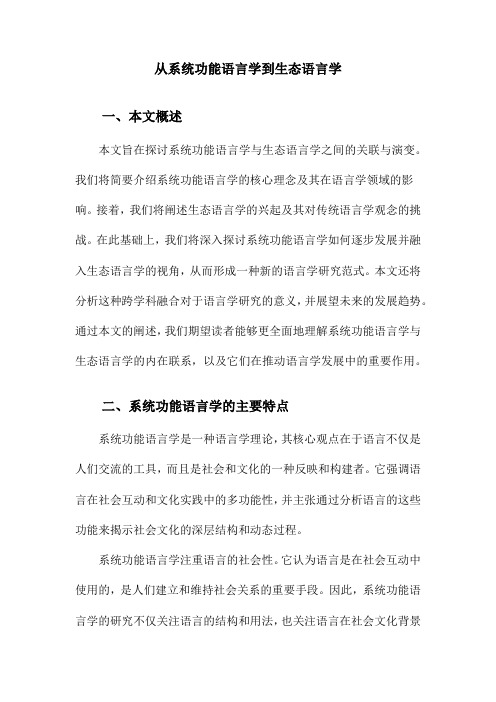
从系统功能语言学到生态语言学一、本文概述本文旨在探讨系统功能语言学与生态语言学之间的关联与演变。
我们将简要介绍系统功能语言学的核心理念及其在语言学领域的影响。
接着,我们将阐述生态语言学的兴起及其对传统语言学观念的挑战。
在此基础上,我们将深入探讨系统功能语言学如何逐步发展并融入生态语言学的视角,从而形成一种新的语言学研究范式。
本文还将分析这种跨学科融合对于语言学研究的意义,并展望未来的发展趋势。
通过本文的阐述,我们期望读者能够更全面地理解系统功能语言学与生态语言学的内在联系,以及它们在推动语言学发展中的重要作用。
二、系统功能语言学的主要特点系统功能语言学是一种语言学理论,其核心观点在于语言不仅是人们交流的工具,而且是社会和文化的一种反映和构建者。
它强调语言在社会互动和文化实践中的多功能性,并主张通过分析语言的这些功能来揭示社会文化的深层结构和动态过程。
系统功能语言学注重语言的社会性。
它认为语言是在社会互动中使用的,是人们建立和维持社会关系的重要手段。
因此,系统功能语言学的研究不仅关注语言的结构和用法,也关注语言在社会文化背景下的意义和功能。
系统功能语言学强调语言的系统性。
它认为语言是一个复杂的系统,其中各个组成部分(如音系、词汇、语法等)相互关联,共同构成语言的整体结构和功能。
系统功能语言学通过分析和描述语言系统的各个层面,来揭示语言的内在规律和运行机制。
系统功能语言学注重语言的动态性。
它认为语言是在不断变化的,受到社会、文化、历史等多种因素的影响。
因此,系统功能语言学不仅关注语言的静态结构,也关注语言的动态演变和发展。
它通过分析语言的变化过程,来揭示社会文化的变迁和发展趋势。
系统功能语言学的主要特点包括注重语言的社会性、系统性和动态性。
这些特点使得系统功能语言学成为一种全面而深入的语言学理论,对于理解语言的本质和功能,以及语言与社会文化的关系具有重要的启示意义。
三、生态语言学的兴起与发展随着全球生态环境问题的日益严峻,语言学研究领域也开始向生态学领域延伸,从而催生了生态语言学的兴起。
系统功能语言学视角下公司网页的生态话语分析
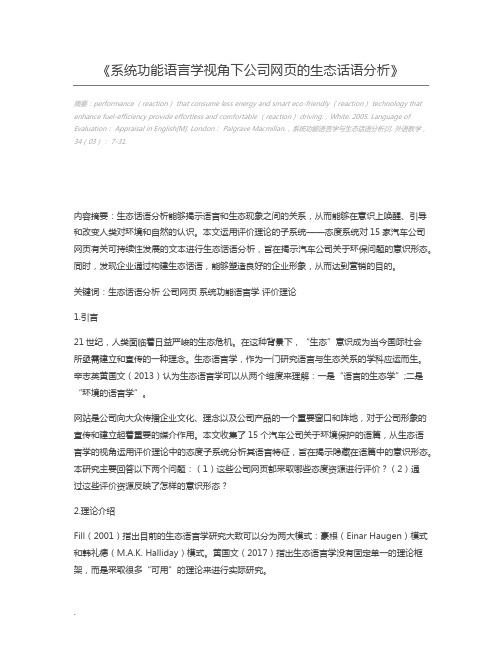
《系统功能语言学视角下公司网页的生态话语分析》摘要:performance (reaction) that consume less energy and smart eco-friendly (reaction) technology that enhance fuel-efficiency provide effortless and comfortable (reaction) driving.,White. 2005. Language of Evaluation: Appraisal in English[M]. London: Palgrave Macmillan.,系统功能语言学与生态话语分析[J]. 外语教学,34(03): 7-31.内容摘要:生态话语分析能够揭示语言和生态现象之间的关系,从而能够在意识上唤醒、引导和改变人类对环境和自然的认识。
本文运用评价理论的子系统——态度系统对15家汽车公司网页有关可持续性发展的文本进行生态话语分析,旨在揭示汽车公司关于环保问题的意识形态。
同时,发现企业通过构建生态话语,能够塑造良好的企业形象,从而达到营销的目的。
关键词:生态话语分析公司网页系统功能语言学评价理论1.引言21世纪,人类面临着日益严峻的生态危机。
在这种背景下,“生态”意识成为当今国际社会所亟需建立和宣传的一种理念。
生态语言学,作为一门研究语言与生态关系的学科应运而生。
辛志英黄国文(2013)认为生态语言学可以从两个维度来理解:一是“语言的生态学”;二是“环境的语言学”。
网站是公司向大众传播企业文化、理念以及公司产品的一个重要窗口和阵地,对于公司形象的宣传和建立起着重要的媒介作用。
本文收集了15个汽车公司关于环境保护的语篇,从生态语言学的视角运用评价理论中的态度子系统分析其语言特征,旨在揭示隐藏在语篇中的意识形态。
本研究主要回答以下两个问题:(1)这些公司网页都采取哪些态度资源进行评价?(2)通过这些评价资源反映了怎样的意识形态?2.理论介绍Fill(2001)指出目前的生态语言学研究大致可以分为两大模式:豪根(Einar Haugen)模式和韩礼德(M.A.K. Halliday)模式。
- 1、下载文档前请自行甄别文档内容的完整性,平台不提供额外的编辑、内容补充、找答案等附加服务。
- 2、"仅部分预览"的文档,不可在线预览部分如存在完整性等问题,可反馈申请退款(可完整预览的文档不适用该条件!)。
- 3、如文档侵犯您的权益,请联系客服反馈,我们会尽快为您处理(人工客服工作时间:9:00-18:30)。
系统功能语言学视角下的生态话语分析
作者:陈遥
来源:《知识文库》2018年第24期
对生态的关注和研究已经成为一个泛学科的议题,而在语言学与生态学的领域交叉中,学者们开始思考如何使语言更适用于表征生态系统,语言如何作用于环境等。
本文对系统功能语言学视角下的生态话语进行一个初步的分析。
随着人类社会的不断发展,人类开发资源的能力逐渐提升,我们从自然中获取以及享用越来越多的资源。
人类的发展是一个征服自然的过程,但另一方面“征服”所造就的后果是自然环境的破坏甚至毁灭,越来越多的物种濒临灭绝的边缘,越来越多的资源存续度减弱。
在生态平衡已遭到破坏的背景下,人类终于开始反思自己的行为。
地球在当今也是我们人类赖以生存的唯一家园。
它的独特性跟不可再生性使得保护地球生态成为人类亟待实践的要务。
而生态环境是人类生存、生产与生活的基本条件。
对于生态的关注已经逐渐变成各个学科领域的研究课题。
本文尝试在系统功能语言学的视角下探讨构建生态话语分析的可能。
通过生态话语分析引导人们对于破坏自然的反思,呼唤出人们保护自然的责任感与义务感,唤醒人类社会的生态意识。
1 生态话语分析的基本定义及概述
21.1生态语言学
“生态学”一词是由德国生物学家Ernst Haeckel于1866年首次提出和定义的。
在后来的不断发展中生态学呈现出一个非常重要的趋势,即生态泛化。
所谓的生态泛化其中的一个表现就是生态学与其他学科的结合,而生态语言学就是由此发展出的一个重要而具有创新性质的独立学科。
生态语言学是一个自然科学和人文科学相交叉的学科领域,它所研究的内容不但包括语言的社会环境,还包括社会所在的生态环境。
现在主要有两个层面上的理解以及研究方向。
第一种是理解为“语言的生态学”,即对语言相关发展生态的研究,例如保护语言的多样性,这有助于人类历史文明的发展与传承,例如探究语言进化的优势:它使得人类能够良好地适应周边环境并进行群体的交流,利用别人累积的知识体系而使得自己在环境的变化中免于其他的威胁。
例如探究语言活力,其数值量化的依据来源于语言群体的整体使用情况,以及是否推出使用该语言的大量教材和印刷读物。
第二种是理解为“环境的语言学”,即对语言在生态环境的影响功能上进行研究。
这一种理解模式著重关注的是语言学家的“社会贡献”,即探讨语言学家在生态保护方面做出的功绩。
这
就涉及到建构生态语法和绿色语法等。
在这一研究角度中,相关研究者的核心任务即是对语言体系中损坏自然生态和谐的要素进行批判性质的剖析,对其表现出的错误的言行进行否定,对研究对象进行深入剖析和评判。
21.2生态语言学的话语分析
而生态语言学的话语分析融入了这一批评语言学的思维模式,从生态学这一研究角度对“社会化的生态意识以及行为进行分析批评”。
虽然在研究中人们把两者紧密结合在一起,但生态话语分析与批评话语分析却有所不同:批评话语分析关注的核心是社会意识,而生态话语分析关注的核心是生态意识;批评话语分析以人为核心分析社会不平,根本上还是以人为本;对于生态话语分析研究者而言,语篇是展示人与生物生态关系的平台,而在批评话语分析者看来,语篇是权势斗争的地点。
总而言之,批评话语分析者的着眼点在于人类自身,相较于生态话语分析者更为广阔和深入的研究领域而言是较为浅薄的。
生态话语分析者所面临以及探究的领域是完全完整的自然的生态系统。
因此,相关研究者需要注意的便是不能完全依据批评话语分析的模式来探讨生态话语分析所要研究的问题,虽然两者有所交叉,但涉猎范围并不一致。
生态话语分析研究的直接目的是展现出语言系统与其余生态现象之间的关系,着重于展示语言和周边世界的共存关系,批判以及展示出人类如何使用语言以人类伦理为尺度和基准,歪曲属于自然界本身的强大的生态伦理。
而生态话语分析研究的根本目的是唤醒人们对于自然生态环境的保护与可持续发展的意识,它将生态环境对于人类本身以及社会发展的重要性渗透学术研究之中,为的是进行长久而深入的生态建构的探索。
2 系统功能语言学的生态话语分析
系统功能语言学(system-functional linguistics)为英国著名的语言学家韩礼德(Halliday)创立。
系统语言学不仅研究语言的性质、语言过程和语言的共同特点等根本性问题,而且探讨语言学的应用问题。
而Halliday在许多场所鲜明地论述了他的语言生态学思想。
在一篇1990年所发表的论文中,他枚举了大量人类对于自然生态环境的破坏行为:快速耗尽自然石油、矿产等自然资源;加速对于某些种类物种的灭绝速度;造成腐蚀性酸雨的产生,等等。
而这种变化过程与语言系统中语言变化的过程是相似的。
语言开始在生态问题上扮演一个新的可干预的角色。
语言学可作为一种手段对社会与文化、政治产生一定的干预效果。
这也正是语言学中生态话语分析所最终需要达成的目标。
它对于生态话语分析者的筛选力是强大的,不仅需要分析者具备高度的社会责任感和生态自觉,同时也将受到其自身语言能力的制约。
而且在同时他也需要时刻警醒自身的语言行为,做到“三省吾身”。
而生态话语分析处理由于其与其他学科研究领域的交叉性要求着分析者跨越语言学的研究领域去找寻其他学科领域的合作研究。
分析者需要持有一个较为开拓的视野以及诚挚的合作精神。
人类生存于自然当中,人类的所有发展都与自然生态环境息息相关。
人类应当把保护自然生态作为核心以及重点的任务目标,保证自然的可持续发展。
同时也就是在保护人类自身的持续发展。
(作者单位:三明学院)。
